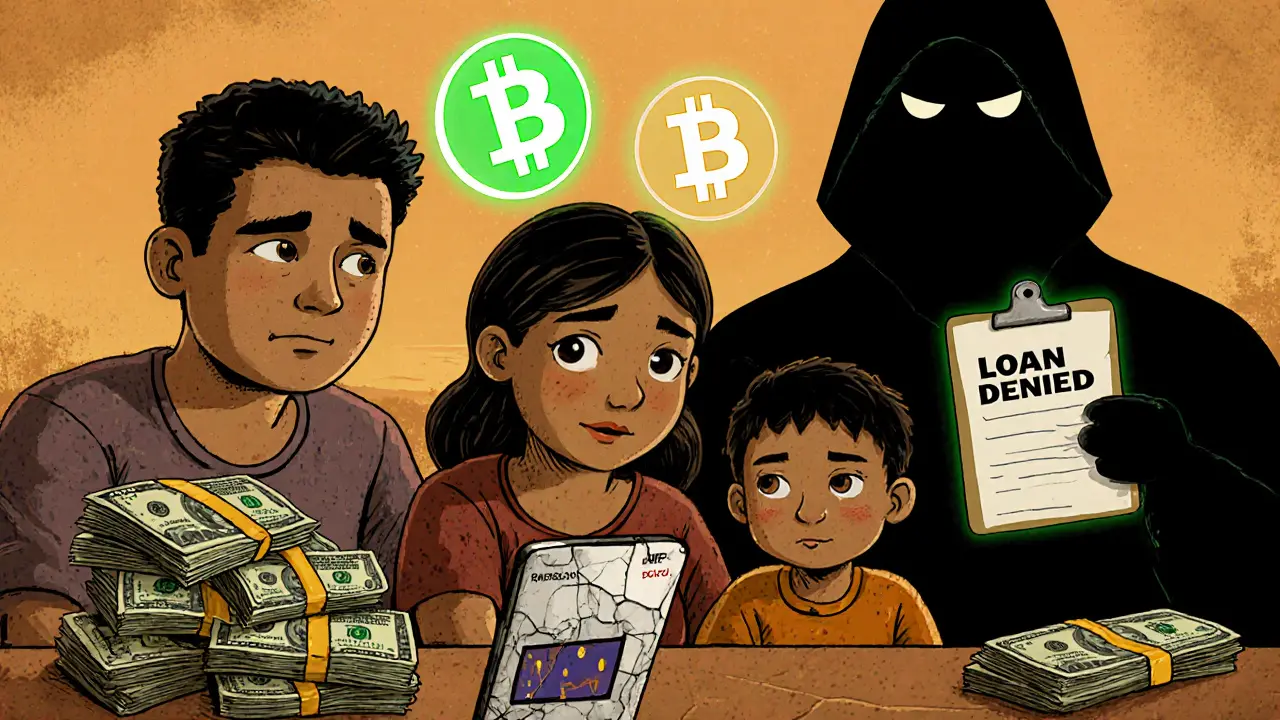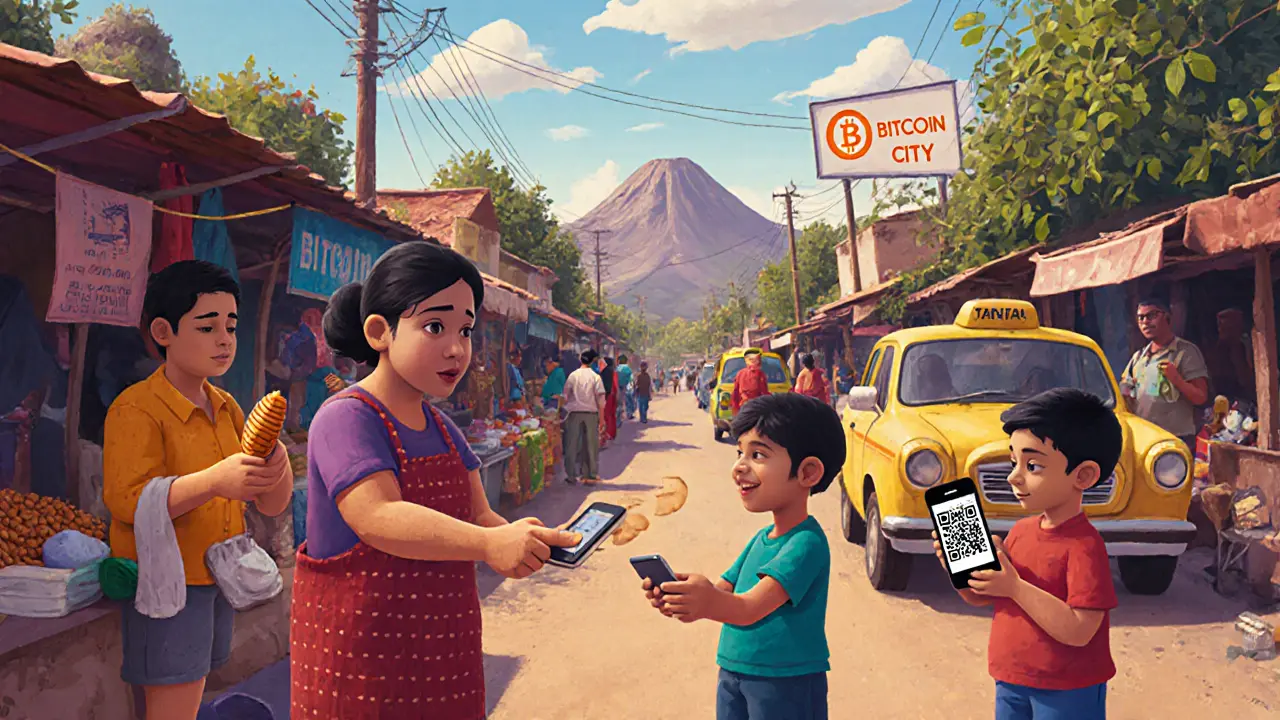El Salvador's Bitcoin Adoption Strategy: What Really Happened and Where Things Stand in 2025
 Jul, 5 2025
Jul, 5 2025
Remittance Cost Calculator
Calculate how much you'd save sending money to El Salvador using Bitcoin compared to traditional services. Based on article data: traditional services charge 10-20% fees while Bitcoin transactions cost approximately $0.50.
Your Savings:
Traditional Fee (15%):
Bitcoin Fee: $0.50
Note: Based on El Salvador article data. Traditional fees assume 15% average rate (10-20% range). Bitcoin transactions cost approximately $0.50 regardless of amount. Actual fees may vary due to market conditions.
El Salvador didn’t just dip its toes into Bitcoin-it jumped in headfirst. In September 2021, it became the first country in the world to make Bitcoin legal tender, a move that shocked financial experts, thrilled crypto believers, and left most of its own citizens shrugging. The goal was simple: give the unbanked access to money, slash remittance fees, and break free from the U.S. dollar’s grip. But by early 2025, the story had flipped. The government quietly dropped Bitcoin’s legal tender status-not because it failed, but because it couldn’t survive the pressure.
Why Bitcoin? The Problem El Salvador Was Trying to Solve
Before Bitcoin, nearly 70% of Salvadorans had no bank account. Sending money home from the U.S. cost 10-20% in fees. That’s $4 billion a year going to middlemen, not families. The country had used the U.S. dollar since 2001, but that didn’t fix access. It just made them dependent on Washington’s monetary policy without any say in it. President Nayib Bukele’s pitch was clear: Bitcoin could cut those fees to near zero, let people send money instantly across borders, and give them real ownership over their savings. No middlemen. No delays. No account minimums. Just a phone and a wallet. The government didn’t just talk about it-they built it. They rolled out the Chivo Wallet, gave every citizen $30 in Bitcoin just to download it, and forced businesses to accept it. At first, it looked like a revolution.What Actually Got Adopted-And What Didn’t
By 2025, 82% of small businesses in El Salvador accepted Bitcoin as payment. That’s not small. Cafes, street vendors, taxi drivers, even rural pharmacies had QR codes for Bitcoin. But here’s the twist: only 1% of remittances were actually sent in Bitcoin. Why? Because most people didn’t use it to spend. They used it to cash out. Someone in the U.S. sends $100 to their family in El Salvador. The family gets it in dollars through Western Union or a money transfer app. Then they use Chivo Wallet to convert a small portion into Bitcoin as a speculative stash-not as daily money. The Chivo Wallet itself was clunky. It crashed often. Customer service was nonexistent. Many users didn’t understand how to secure their private keys. Some lost money. Others just deleted the app after the $30 ran out. Meanwhile, the government kept buying Bitcoin. Even as prices dropped in 2022 and 2023, they bought more. By March 2025, their Strategic Bitcoin Reserve Fund held 6,102 coins-worth roughly $500 million. That’s not a side bet. That’s a national asset.The IMF Forced a Retreat
In January 2025, El Salvador officially removed Bitcoin’s legal tender status. Not because the people rejected it. Not because it didn’t work technically. But because the International Monetary Fund said: no Bitcoin as legal tender, no $1.4 billion loan. The IMF’s argument was simple: Bitcoin’s volatility was a threat to macroeconomic stability. If the government held Bitcoin as reserves and its price crashed, the country’s fiscal health could collapse overnight. They also worried about money laundering, tax evasion, and the lack of regulatory oversight. El Salvador had no choice. The loan was for basic infrastructure, public sector wages, and debt payments. So they backed down. Bitcoin is no longer required to be accepted by businesses. It’s optional. Like cash. Like credit cards. But here’s what didn’t change: the government still owns Bitcoin. Still promotes blockchain. Still wants to be a crypto hub.
The Bitcoin City That Never Was (But Still Might Be)
In 2021, Bukele announced Bitcoin City-a futuristic metropolis powered by geothermal energy from the Conchagua volcano. It would be tax-free, built with Bitcoin-backed bonds, and attract global crypto firms. The idea captured headlines. Investors drooled. Critics called it a fantasy. By 2025, construction had barely begun. No bonds were issued. No major companies moved in. But the dream didn’t die. The government still talks about it. The land is still reserved. The geothermal plans are still in place. It’s not dead-it’s on pause. What’s real is the PLANB Forum 2025, held in San Salvador in February. Over 12,000 attendees from 40 countries showed up. Startups, miners, developers, and investors all came to El Salvador. That’s not a coincidence. The country is betting on being the region’s crypto gateway-not because it’s legal tender, but because it’s the only place in Latin America that ever tried it.What’s Working Now? The Quiet Successes
Forget legal tender. Look at what actually changed:- Over 2 million Salvadorans now have Bitcoin Lightning wallets-more than have traditional bank accounts.
- Remittance corridors are now using Bitcoin privately. Companies like Strike and Bitso process billions in cross-border payments without touching the government’s system.
- Local developers are building crypto tools tailored to Salvadoran needs: apps that auto-convert Bitcoin to dollars at point of sale, SMS-based wallets for people without smartphones, and peer-to-peer trading platforms.
- The country’s blockchain infrastructure is now more advanced than most of its neighbors. Internet access, mobile penetration, and digital literacy rose because of the push.

Why the Critics Were Half Right
The Economist called it a failure. The IMF called it dangerous. Financial experts warned of collapse. And yes-there were problems. Bitcoin’s price swung wildly. The government bought at $40,000, $60,000, $30,000. Their reserve value jumped and plunged. That’s not sustainable for a national treasury. The rollout was chaotic. No clear rules. No consumer protections. No fallback when wallets failed. People got scammed. Some lost life savings. But here’s what the critics missed: they were measuring success by the wrong metric. They looked at GDP impact, treasury stability, and legal compliance. But the real metric was empowerment. A farmer in Santa Ana can now receive money from his son in Los Angeles in 12 seconds, for $0.50, without waiting in line or showing ID. That’s not a macroeconomic win. That’s a human one.Where El Salvador Goes From Here
In 2025, El Salvador isn’t a Bitcoin nation. It’s a Bitcoin-experiment nation. And that’s okay. The country is now quietly building a hybrid model:- Bitcoin is accepted, but not required.
- The state holds Bitcoin as a reserve asset, not as currency.
- Private companies lead adoption-Chivo Wallet is now just one option among many.
- Education continues in schools and community centers.
- The government still invests in blockchain tech, crypto startups, and digital infrastructure.
Tony spart
November 26, 2025 AT 11:11and dont even get me started on that bitcoin city fantasy. geothermal energy? sure buddy. next they'll claim the volcano is mined by elves.
Mark Adelmann
November 28, 2025 AT 03:57the chivo wallet sucked, yeah. but people learned. they figured out how to send btc, how to convert it, how to protect their keys. that’s education you can’t buy.
the government messed up the rollout, but the people? they adapted. and that’s what matters.
Angel RYAN
November 29, 2025 AT 17:26strike bitso and local devs built tools that actually work for real people
bitcoin isn't the hero here the people are
they took a confusing tech and made it useful anyway
Abby cant tell ya
November 30, 2025 AT 18:58Vance Ashby
December 2, 2025 AT 10:47Brian Bernfeld
December 4, 2025 AT 04:35the imf wanted control. the people wanted freedom. guess who won?
yes the legal tender status got pulled. but the mindset? that’s locked in. now you’ve got devs building tools for the unbanked, remittance corridors bypassing western union, and a generation that knows crypto isn’t magic - it’s just money that works differently.
the government made mistakes. the rollout was messy. the chivo wallet was a disaster. but you know what? people still kept using it. because it gave them something they never had before: autonomy.
they didn’t need to be told bitcoin was good. they learned it the hard way. lost money. got scammed. had their phone crash. still kept going.
that’s not adoption. that’s evolution.
and now? they’re not pushing it as policy. they’re letting it breathe. letting the market, the people, the apps decide what works. that’s smarter than any imf memo.
this isn’t about replacing the dollar. it’s about giving people more tools. more choices. more dignity.
el salvador didn’t fail. it just outgrew the experiment. and the world is finally starting to notice.